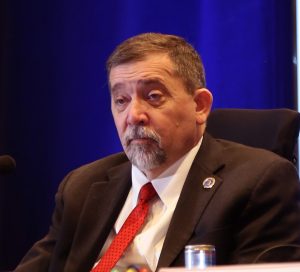Annual House and Senate Committees on Veterans’ Affairs testimony
By Charles Brown
This past March, I had the amazing opportunity and incredible privilege to represent Paralyzed Veterans of America (PVA) by speaking before a joint hearing of the House and Senate Committees on Veterans’ Affairs.
This testimony that helps highlight PVA’s annual Advocacy and Legislation Seminar is an invaluable opportunity to instill in Congress the importance of veterans’ health care, benefits, civil rights and caregiver support.
It’s the tradition of PN to publish the PVA national president’s oral testimony from this hearing, and the following is mine:
“Chairman [Jon] Tester, Chairman [Mark] Takano and members of the committees, I appreciate the opportunity to speak with you today on behalf of the tens of thousands of veterans with spinal-cord injuries and disorders who depend heavily on the benefits and health care available through the Department of Veterans Affairs (VA). This week, PVA members from our 33 chapters will be meeting virtually with their members of Congress to strongly advocate for the legislation that is critical to their ongoing health and independence.
“My written testimony includes the full list of PVA’s 2022 priorities. In the interest of time, I would like to focus on three critically important issues that Congress must address: improved access to specialty systems of care; expanded access to home and community-based services, or HCBS; and increased access to benefits that promote the health, safety and independence of catastrophically disabled veterans.
“First, PVA firmly believes VA is the best health care provider for veterans with catastrophic disabilities. Their spinal-cord injury and disorder, or SCI/D, system of care provides a coordinated lifelong continuum of services for paralyzed veterans. There is no comparable private system of care. As a result, we are deeply concerned by recent reports that VA intends to recommend as part of the Asset and Infrastructure Review process to close or consolidate some SCI/D centers. We believe that services must be maintained in line with an accurate assessment of available resources and the true needs of veterans with SCI/D.
“In the meantime, we are concerned about VA’s current workforce crisis, which although ongoing has been made much worse by the [novel coronavirus, or COVID-19] pandemic. PVA estimates there is a shortage of several hundred nurses in the SCI/D system of care, which limits bed availability for admission to an SCI/D center, reducing access for specialized care delivery. We urge Congress to pass the VA Nurse and Physician Assistant RAISE Act to help VA address staffing concerns and fulfill its mission to take care of veterans.
“We also call on Congress to pass the MAMMO [Making Advances in Mammography and Medical Options for Veterans] Act. Mammography services are critical in ensuring the health of our women veterans who see an increased prevalence of breast cancer compared to their civilian counterparts. However, as many PVA women members can attest, not all screening devices, whether in VA or the community, are accessible for wheelchair users. No woman veteran should have less than full access to care, especially simply because she has a disability.
“The second issue I will address is improved access to HCBS. I, along with many of my fellow PVA members, live independently but depend upon the services of a caregiver to help us with basic activities of daily living, such as getting out of bed, dressing and taking care of basic bodily needs.
“One Saturday morning last fall, I was informed that the VA-contracted nursing agency would not be sending anyone to assist me in getting out of bed because no one was available. Trapped in my bed, I realized that I could be looking at 25 hours without the ability to take care of my bodily needs, take my medications, eat or drink or do anything except wait. Thankfully, I was able to eventually find someone to come and help me.
“When I contacted my VA social worker the following week, I was told that I needed to have someone available to assist me when the system fails. When I sustained my SCI during my military service, I knew that there would be significant barriers and challenges, but I never dreamed that I would literally be abandoned by a system that was supposed to support me and my fellow veterans.
“No veteran should ever be faced with this situation. That’s why PVA gives its strongest endorsement for the recently introduced Elizabeth Dole Home and Community Based Services for Veterans and Caregivers Act. This critically important legislation would make urgently needed improvements to VA HCBS, including expanding the Veteran Directed Care program to all VA medical centers, creating pilot programs to address direct care worker shortages and increasing access to respite care. We urge Congress to pass this bipartisan legislation this year.
“Finally, we need Congress to pass pending legislation that would increase access to benefits that promote health, safety and independence. I want to highlight legislation that would increase access to adapted vehicles.
“Catastrophically disabled veterans receive one automobile grant during their lifetime. The current grant pays, at most, for one-half to one-third the cost of a vehicle that can be adapted. A safe, accessible vehicle is not a luxury for wheelchair users who often encounter barriers in accessing transportation options, including air travel, open to other Americans. We urge you to pass either the AUTO for Veterans Act or the CARS for Vets Act this year.
“Thank you again for this opportunity to share our views and your ongoing commitment to paralyzed veterans and their caregivers. I would be happy to answer any questions you may have.”



